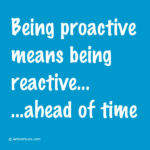
What does it mean to be proactive, as opposed to reactive? And how can we do it? This is what this article is about.
The word “reactive” implies that you don’t have the initiative. You let the events set the agenda. You’re tossed and turned, so to speak, by the tides of life. Each new wave catches you by surprise. Huffing and puffing, you scramble to react to it in order to just stay afloat.
In contrast, the image we associate with “proactivity” is one of grace under stress. To stay with the previous analogy, let’s say you’re in choppy waters. Now, you look more at ease. It’s not just that you anticipate the waves. You’re in tune with them. You’re not desperately trying to escape them; you’re dancing with them.
It would be great to dance with the rhythm of life, using the ebb and flow of events as a source of energy. But is this only possible to those people who are endowed with a proactive attitude (or, maybe, a “proactive gene”)?
I believe that being proactive is not a mysterious quality that we have, or don’t have. It is a way of dealing with things, that we can develop and strengthen.
What, then, is this skill?
In a nutshell, being proactive is the same thing as being reactive. The only difference is: you do the reacting ahead of time.
Let’s go back to the example of the two swimmers on the choppy seas. The difference between them is that the proactive swimmer anticipates that there will be waves, whereas the reactive one is painfully surprised by each wave.
The difference is one of perspective. The proactive swimmer sees the big picture: each wave is not an isolated incident but is part of a pattern. While there is stress in dealing with difficult circumstances, there is a consistency and a logic to the environment. There’s a degree of predictability.
With this bigger picture in mind, the proactive swimmer is able to adapt to the ups and downs. As he does so, he “learns” the patterns of the waves from inside out, so that his reactions become more and more spontaneous, more and more in tune with the rhythm of the waves.
So, being proactive means being able to anticipate what the future will be, and to react accordingly before it actually happens.
What is it that prevents the reactive swimmer from doing so? It could be a lack of information. There are plenty of events in life that we simply cannot predict. It could also be a lack of intelligence: some people are better than others at thinking in terms of patterns.
But let’s assume, for the moment, that our two swimmers have both the same levels of information and intelligence. Then, the difference between them would simply be that the proactive swimmer has enough energy to take in the available information and adapt to it. In contrast, the reactive swimmer is exhausted and overwhelmed (“Somebody get me out of here, please!”).
What does this metaphor have to do with understanding how you can be more proactive in your life? Three things:
ONE: To be proactive, what you have to do is ask yourself what is likely to happen, and react to it before it happens.
TWO: It takes energy to rise above the difficulties of the moment, to see the big picture and to make the changes you need to make.
THREE: Sometimes, you may not have that energy. At such times, it serves no purpose to berate yourself for being weak. Think of your “reactivity” as a symptom instead of a failure. You need a break. Take it.
Let’s imagine that our exhausted swimmer finds a raft. From this stable vantage point, wouldn’t he be better able to see the big picture? After some rest, wouldn’t he be better able to deal with the pattern of the waves?
Sometimes, the most proactive thing you can do is take a break. Use this “Time Out” to refocus on what you’re doing and how you’re doing it.